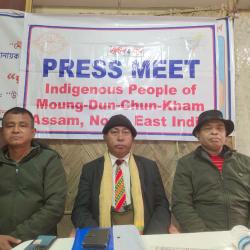The entry of outsiders, particularly from across the international border into Meghalaya, and the rest of this region, cannot be curtailed with the aid of Bengal Eastern Frontier Regulation or Inner Line Permit (ILP) – which is the demand of certain NGOs here. In fact we have to ascertain the ground realities and tune the demand accordingly. A poor Bangladesh will continue to push its people into India and look for livelihood avenues. We have recently heard a senator from USA who was countering enquiry about the steps taken by the Obama administration to deport hundreds of Mexicans who have reportedly sneaked into its territory. The senator said that the economic policies of Obama administration are in reality pulling other nationals to its soil. That may be true from a political angle but the reality is that even an advanced country like USA with the best border fencing on earth is unable to stop illegal influx into its soil. But there is a system in USA if they encounter illegal immigrants then they deport them under international law, immediately. Well whether the new Indian government economic policies are pulling neighbouring nationals into its soil is arguable because poor Bangladeshis will continue to take the risk to enter this country to earn a living which they cannot afford back home. This view is in fact shared by a visiting Dacca University professor recently to Shillong.
Influx is taking place all over the world. But it is up to the locals to denounce them and literally prevent them from taking any avenues. After all how much can a democratic elected government do if we show our patronage? What is seen in case of influx from Bangladesh here is that these people tend to mingle with the local tribesmen, particularly with the females because they know it well that the matrilineal setup will play to their advantage, then. So marriage and conversion takes place in no time and with it follows a sea of opportunities for the new entrant in terms of citizenship, business, voter cards, government beneficiaries and what have you. There are millions of such entrants who have made this region a safe haven for them. So how this has happened? Had it taken place if our tribesmen have not allowed them to settle down here or yield to them? Let us take the example of Manipur. The Manipuris are extremely alert in maintaining their culture and tradition. No matter wherever they are they will never mingle with others, so much that it might threaten their own society. And so we still see that Manipur have not lost their own identity, culture and tradition to westernisation and influx as seen here in Meghalaya. In Manipur, marriage and social relationship is significantly knotted among their own brethren. There may be a demand for ILP even there but that is more out of fear. In Meghalaya there is also fear but it is opaque. The mingling in Meghalaya right from the British Raj till this date with outsiders cannot be ruled out no matter how hard it may sound the NGOs crusade thereof. The fault lies with the tribesmen themselves for having allowed this day to take place.
The mad yearn for dollars by extracting coal by miners from across the border have ruined not only their own environment but even the demographic pattern. Let us be totally upright here that today we have hundreds of Islamic names with tribal surnames in Meghalaya which were not heard or seen earlier. How? Had the tribal maintained a Manipuri type restraint would it have ever taken place? So who is the culprit? Why can’t they resist? In one hand they are shouting for ILP whereas on the other tribesmen showing undue patronage to those from across the international border. Is this not only making tasks easier for those who are planning to make an entry here. I am pretty sure that there is an understanding in the neighbouring country how to settle here with the aid of matrilineality. I have argued in this column in the past that the future of tribesmen in Meghalaya is in their own hands. An instrument like ILP may prevent those who are following the legal route to enter this state but what about the tribesmen themselves who are susceptible to “mynders”. So what are our NGOs really fighting for? Is it not sane to set our own house in order than clamour for a law?
It may sound straight but tribesmen here have wilfully neglected their own downfall for fear of what is best known to them. Till date we haven’t seen, except few, voicing their concern on genuine issues that may change ground realities. They shout and protest only when a genuine non-tribal, who has made this state his home since time immemorial and is contributing here, is at the centre of attraction whereas they are mute if the same issue is centred on a tribal. On one hand they are fighting for their cause targeting all non-tribal without scouting their antecedents whereas on the other “mynders” from across the international border continues to wreak havoc. Now who can show them this reality if they cannot see this with their own eyes? Or do they fear that they can’t do much in these cases because one side is tribal, “shyiap”. Such double standard is only ruining their own society at large and nothing else. As it is said that history repeats itself, it is high time that we should learn from our neighbours where genuine residents were targeted in the past with the aid of people from across the international border resulting in locals being outnumbered.
It is good to hate when it is directed at the wrong ones. A region where mainland Indians are despised and shunned whereas those from across the border is “embraced” is like digging own graves. At least try and understand for self’s sake who are our own ones and who outsiders are. If a poor Bangladesh need to push its people into India then the same applies in case of Meghalaya – which have to push its tribesmen to mainland India for better opportunities. Manipur, despite its economy in turmoil is not only maintaining its society, tradition and culture but also in education, sports and other sectors which is indeed commendable. Today, the largest diaspora of students from this region in New Delhi hails from Manipur who are making their marks felt. Meghalaya too have to realize this critical fact that the mainland Indians whom they are shunning back in their den, it is their states where they might end up with a good job or career someday. This author have been told by an octogenarian resident whose son is working in defence in Karnataka that there Bangladeshi women who have sneaked into India are working as housemaids, domestic workers, babysitters and the rest of it. They have even changed their names to Durga, Parvati and other local names there. The same is also the case in Maharashtra and other Indian states where they have shed their Islamic identity to mingle with the mainstream society so that they are not identified with their roots. They are in much better position to effect these changes because their appearance is similar to the mainlanders and can speak in Hindi. The tribesmen from Meghalaya cannot afford to do this because neither their appearance is matching nor can they speak the national language. So even if they change their name their appearance and dialect may not match. In that way they are in a disadvantageous position. The only way therefore is to treat the mainlanders dearly back home and hate those that are changing everything from across the border. Their patronage must be directed to the right side in their own interest. After all being an independent state of India surviving on doles given by the Indian government they will need to rely on this government. Let the state government do its job, but the little that tribesmen here can do is to eschew the migrants and dry up their sources of income. This hatred for outsiders must be directed in the interest of the self.
- 9938 reads










Add new comment